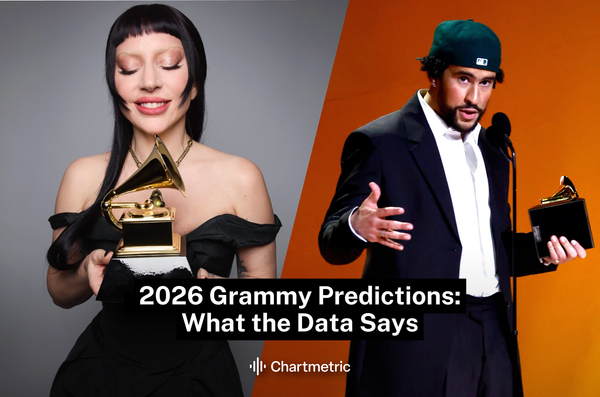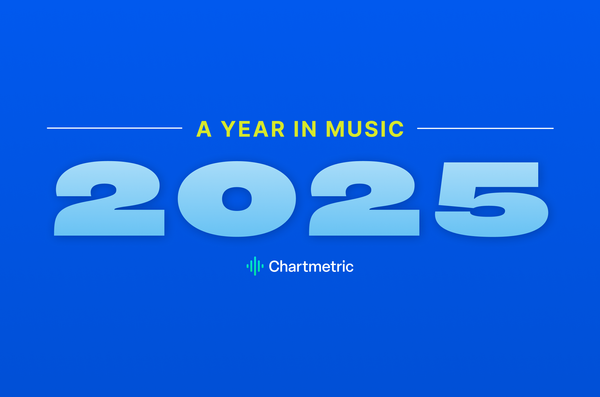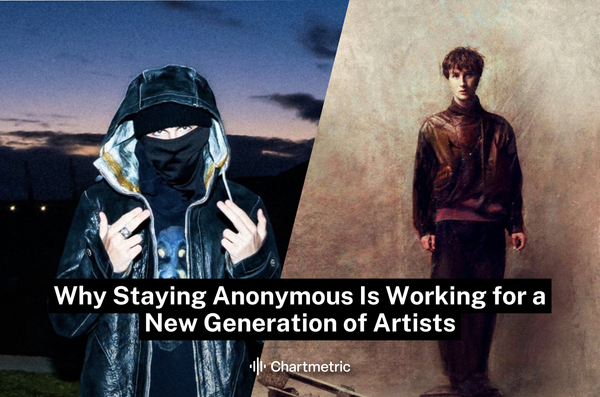“I know that there is some Black girl out there — so many Black women out there that are watching me right now, and I want to tell you: You can do it. Anything is possible.” Doechii spoke those words moments after she took hold of her Grammy for Best Rap Album, closing her heartfelt speech by saying: “You are exactly who you need to be, to be right where you are.”
Doechii won the prestigious award for her 2024 mixtape, ALLIGATOR BITES NEVER HEAL. In between the boom-bap beats and razor-sharp flow, she tells the world exactly who she is. The music industry at large is not only accepting her for it, but they are also celebrating her.
Since releasing the mixtape on August 30, 2024, her Spotify Monthly Listeners have increased by over 700%, peaking on April 3rd at 60.1 million.
This kind of sharp and exponential success can only come when an audience connects to the human behind the music, and in order to create that connection, the artist simply must show their true self. Unfiltered and complete.
“It's a mixture of her creativity, honesty, and storytelling. In a time where a lot of music feels like it's made for Tiktok trends, Doechii has added a fresh perspective,” says Shanae Hardy, a music journalist well-versed in hip-hop.
In 2025 the general music audience is more receptive to this type of honesty from female rappers than ever before. For many years, the biggest female rappers were in the realm of what Hardy describes as “pussy rap.” The style is most clearly heard in songs like “WAP” by Cardi B featuring Megan Thee Stallion and “Yeah Glo!” by Glorilla. They depict glamorous lifestyles delivered with a swaggy tone of extreme confidence.
These songs are honest in that these women live the lifestyle they describe as successful musicians. But very few people in their audiences can relate to that story. The opposite is true of Doechii. So many people relate to her, and audiences have been trending towards honest women for the past several years.
The trend began with women in pop music. Billie Eilish, who at the time of writing has 100.3 million Spotify Monthly Listeners, has never shied away from any personal information. Her song “Not My Responsibility” lays bare her struggles with comments about her appearance throughout her rise to stardom. In her Apple TV+ documentary, The World’s A Little Blurry, she shared passages from her journal that denoted self-harm.
@billieeilish_empire #billieeilish #billieeillishdocumentray #billie #BILLIEEILISH #billiefans #theworldsalittleblurry #documentary #wwafawdwg #appletv #foryou #fyp
♬ Originalton - billieeilish_empire
The honesty trend continues in pop through fast-rising stars like Lola Young. Her smash hit single, “Messy,” is a raw musical sermon about the internal struggle she feels to fit into what society expects from women, and it has over 570 million streams in less than a year.
This trend is largely possible thanks to Gen-Z, who now make up a significant portion of the music audience. As the first generation to grow up with social media, they've been immersed in constant self-expression, making authenticity not just appreciated, but expected.
“Even outside of music, Gen-Z as consumers want honest branding. They don't want the overly perfect aesthetic. They want relatability,” Hardy says, referencing her experience as an e-commerce copywriter marketing to younger audiences. “They're listening to music the same way. They're not going toward artists that were built by the machine, but the artists who are still able to be themselves.”
Now that this trend is fully formed in pop, it is extending to other genres. Hip-hop, the #1 genre on Chartmetric in 2024, has come first. Doechii is a notable example. Some of her raps depict her struggles with sobriety (“DENIAL IS A RIVER”) and mental health (“Anxiety”). In others, she stands firm as a proud queer woman (“NISSAN ALTIMA”).
“Women are a huge part of the hip-hop fanbase. We've always bought the tickets. We've always been either in the forefront or behind the scenes in hip-hop culture. Having someone of that caliber speak to women and speak to our experiences, it's adding a fresh perspective in the context of today,” Hardy says.
One key factor in today’s music landscape is playlists. Nearly 2 billion music discoveries happen every day through Spotify playlists. As such, examining playlist growth is a clear sign of how an artist is resonating with general audiences. Honest female rappers are not only seeing consistent growth, but they are outperforming the most successful female rappers who veer towards less relatable lyrics.
SZA is the most prominent example of an honest female rapper. The R&B/hip-hop crossover artist was the first woman signed to TDE (Doechii’s label), and her playlist reach has been both immense and consistent since 2016. Back then, she was on 28.6k user-generated playlists. That number has grown to 1.5 million, increasing her reach from 22.8 million to 268.8 million. To boot, her sophomore album, SOS, recently broke Michael Jackson’s record for the longest-running top-10 album by a Black artist in history.
As with Doechii’s ALLIGATOR BITES NEVER HEAL, SOS paints a precise picture of what’s happening in SZA’s mind. The biggest song from the record, “Kill Bill,” is a break-up song, but it doesn’t rely solely on total depression or combative anger. It broaches emotional extremes while diving into the complexities of this essential human experience:
“I might kill my ex, not the best idea/His new girlfriend's next, how'd I get here?/I might kill my ex, I still love him though/Rather be in jail than alone”
Doechii’s playlist growth is more reflective of her recent rise to fame. Now her editorial reach is 164.7 million, and her user-generated playlist reach has seen an uptick as well, going from 28 million to 62.5 million.
At first glance, Doechii’s numbers might not seem to suggest a trend in celebrating honest storytelling from female rappers, considering that she is still in the midst of a major rise. However, looking at the stats of female rappers who are less focused on storytelling paints a less ambiguous picture.
Doja Cat, Cardi B, Glorilla, and Nicki Minaj are all alongside Doechii in the current top 10 female rappers by Chartmetric score. Yet, despite all their various successes, including tracks that have joined the billions club, the only one who has ever had a higher editorial playlist reach than Doechii is Doja Cat. She reached 166 million in June 2024 but immediately fell down to 55.7 million by August.
Furthermore, this trend of celebrating honesty extends to artists who aren’t at the forefront of pop culture either. Rapsody, another female rapper who has worked with everyone from Erykah Badu to Kendrick Lamar to Lil Wayne, had an editorial playlist reach of 416k in February 2018. Now it’s 5.3 million, and her highest peak was 13.6 million as a result of “12 Problems.” This song is a matter-of-fact survey of the state of policing in the US following the nationwide George Floyd protests.
Even honest female rappers from the earliest years of hip-hop are seeing a recent boost. Similar to today, the biggest female rappers in the 80s and 90s, such as Missy Elliot and Salt ‘N Peppa, frequently rapped about the party. Queen Latifah and Da Brat, were going deeper, but they weren’t as recognized. This is also likely due to the fact that both of them are queer just like Doechii, and since Doechii’s Grammy win, both Queen Latifah and Da Brat have seen an uptick in numbers.
"Their stories and their truths have never been spoken to before. [Doechii’s] story is relatable to people who may have felt invisible in the bigger hip-hop landscape,” Hardy says.
Despite all this progress predicated on the honesty of female rappers like Doechii, Hardy is sure to elucidate that there is still a lot of work to do toward equality in hip-hop, let alone music as a whole. But as a huge fan of hip-hop, this current trend is bringing about a feeling of optimism for the future:
“I think Doechii’s ascension is going to open the doors for a lot more artists like her. Artists who don't necessarily fit the mold that we've seen typically in the past. Male. Heterosexual. That is exciting to think about. We could have more voices and more stories represented in a genre that I love as much as I love hip-hop, that, to be honest, hasn't been too receptive to people who don't fit into that mold. Especially women. Especially Black women,” Hardy says. “I don't think we've ever seen a dark-skinned, openly queer black woman be celebrated on a global platform like winning the Grammys. That's a huge deal.”
Doechii was only the third woman to win “Best Rap Album.” Lauryn Hill and Cardi B were the two who came before. Perhaps the way honesty from female rappers is becoming a celebrated trend, Grammy-winning female rappers may soon become a trend as well.






